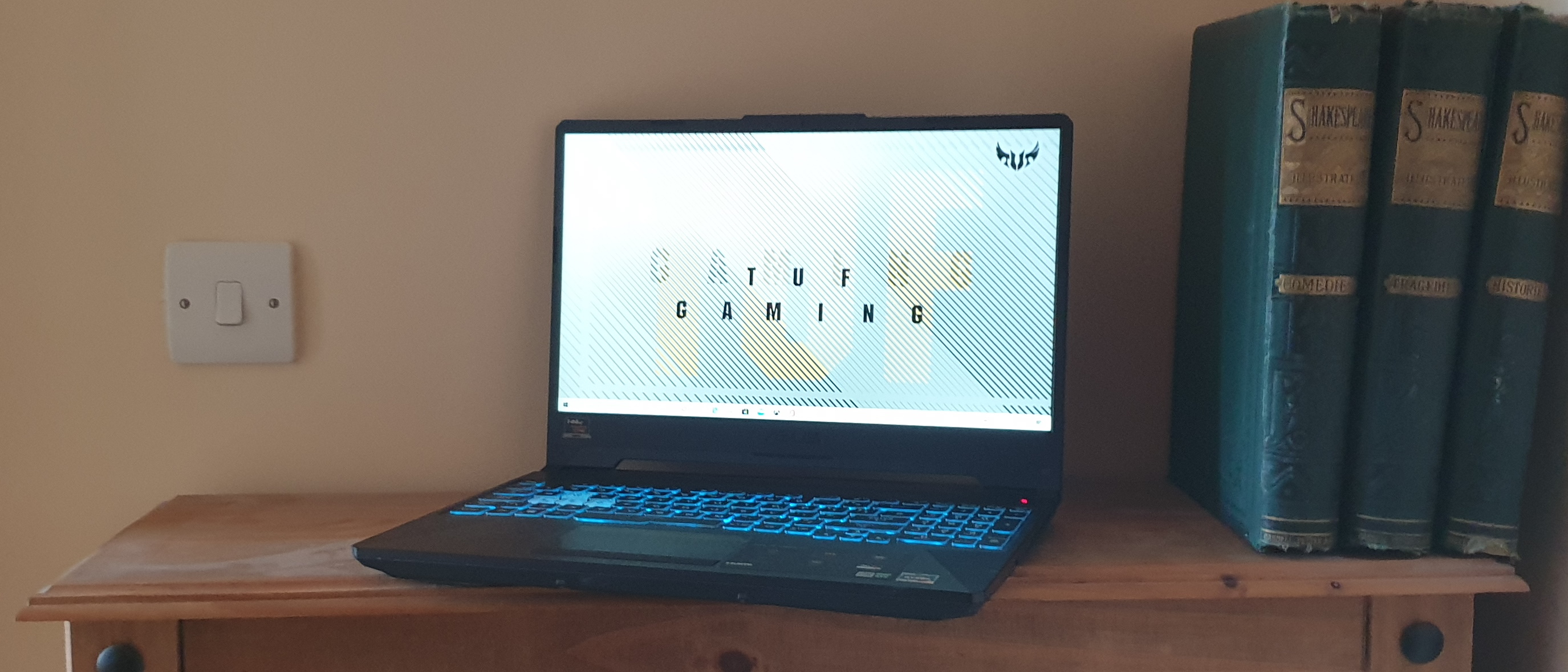TechRadar Verdict
The Asus TUF A15 is a brilliant affordable gaming laptop that manages to strike the right balance between performance and value. It’s strong 1080p performance, tough build quality, and large selection of ports will win it a lot of fans, especially amongst competitive esports players.
Pros
- +
Great 1080p performance
- +
Good value
- +
New AMD processors
- +
Very good battery life
Cons
- -
Noisy fans
- -
Not the most powerful gaming laptop
- -
Design won’t be for everyone
Why you can trust TechRadar
In the Asus TUF A15, we’ve found one of the most compelling gaming laptops in recent memory. It’s not exciting for the typical reasons that usually accompany a new gaming device, however.
It doesn’t come packed with the top-of-the-line flagship components that power the best gaming PCs. And, it’s not outfitted with the kind of flashiness that you would find in Asus’ Zephyrus gaming laptops, which are also plenty powerful in their own right. In fact, the Asus TUF A15 is a pretty standard looking gaming laptop.
The Asus TUF A15 (also known as the Asus F506IV) sets itself apart by offering great performance, powered by the solid Nvidia RTX 2060 GPU and the AMD Ryzen 4000 mobile CPUs that have seriously impressed us, in a gaming laptop whose quality of performance is matched by a very reasonable price tag.
Price and availability
Here is the Asus TUF A15 configuration sent to TechRadar for review:
CPU: 2.9GHz AMD Ryzen 7 4800H Processor (octa-core, 8MB cache, up to 4.2GHz boost)
Graphics: Nvidia GeForce RTX 2060 6GB GDDR6
RAM: 16GB LPDDR4 (3200MHz)
Screen: 15.6-inch Full HD (1080 x 2560) LED 144Hz
Storage: 1TB SSD (PCIe, NVMe, M.2)
Ports: 1 x audio jack, 2 x Type-A USB 3.2 (Gen 1), 1 x Type-C USB 3.2 (Gen 2), 1 x Type-A USB2.0, 1 x RJ45 LAN, 1 x HDMI 2.0b
Connectivity: Intel Wi-Fi 5, Bluetooth 5
Camera: 720p
Weight: 5.07 pounds (2.3 kg)
Size: 39.5 x 25.6 x 2.49cm (W x D x H)
The Asus TUF A15 is what we would call an affordable gaming laptop, which means it’s not as cheap as budget offerings, but nor is it as expensive as high-end gaming laptops aimed at enthusiasts.
Still, ‘affordable’ when it comes to gaming laptops still means a decent chunk of change, and the Asus TUF A15 starts out at $1,300 (£1,300, around $2,000). That’s certainly pricey, although it offers much better value for money compared to some gaming laptops, such as the Alienware m15.
So, you’re looking at a price in the same ballpark as the HP Omen 15 and Dell G3 15, both fine 15-inch gaming laptops, but ones which don't, at the time of writing, offer quite as recent components as the Asus TUF A15.
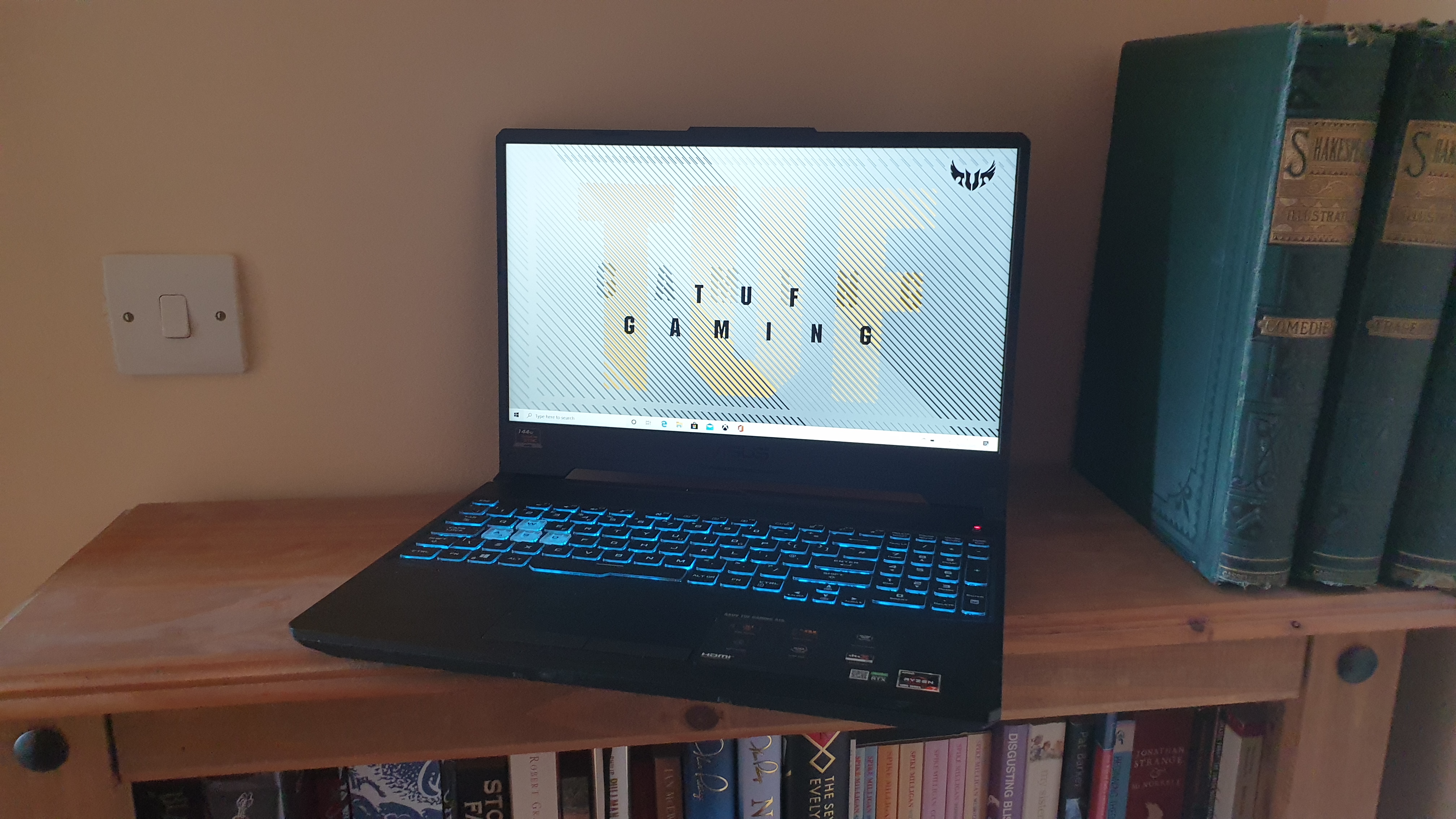
Design
As with other gaming laptops in Asus’ TUF series, the Asus TUF A15 is a big, chunky device that’s a far cry from Asus’ Zephyrus range – but then, that’s part of the appeal. As the ‘TUF’ moniker alludes to, the Asus TUF A15 places build quality and durability at the forefront of its design.
This isn’t a rugged laptop that you could drop from a height and not worry about it, but it’s a gaming laptop you’d happily chuck in a backpack and take to friends’ houses and LAN parties. Some ultra-thin and light gaming laptops feel so delicate that you’d be frightened of taking them out of the house – not so with the Asus TUF A15.
It’s certainly a design that doesn’t shy away from the fact that this is a gaming machine, but it’s not completely overboard either – and if you’d like to give it some more gamer cred, the Asus TUF A15 comes with a sheet of stickers to cover the laptop with. The chassis comes in two colors: Fortress Gray (the color of our review model, as pictured) and Bonfire Black.
On opening the laptop, there are even more design choices to appeal to gamers. There’s the almost obligatory RGB lighting for the keys, and the all-important WASD keys are further highlighted with a translucent coloring, leaving you in no doubt that this is a laptop for gaming on.
The industrial design is certainly appealing, and it’s functional too. It gives the laptop extra protection from knocks and bumps, and there's also a honeycomb design on the base of the machine, which keeps the device from sliding about, with the cells in the structure housing cooling vents.
The chunky design also allows Asus to pack in plenty of ports, with an Ethernet port, HDMI, two standard USB ports and a USB-C port on the left-hand side, along with a port to plug in the power supply, while on the right-hand side there’s another standard USB.
It’s a good selection, and should allow you to hook up your favorite peripherals without the need of an adapter. The LAN port is especially welcome on a gaming laptop, offering as it does faster and more reliable network speeds.
Meanwhile, the screen is a nice, large, 15.6-inch 1080p display with 144Hz refresh rate, further bolstering the TUF A15's gaming credentials. You can also get a version that tops out at a 60Hz refresh rate.
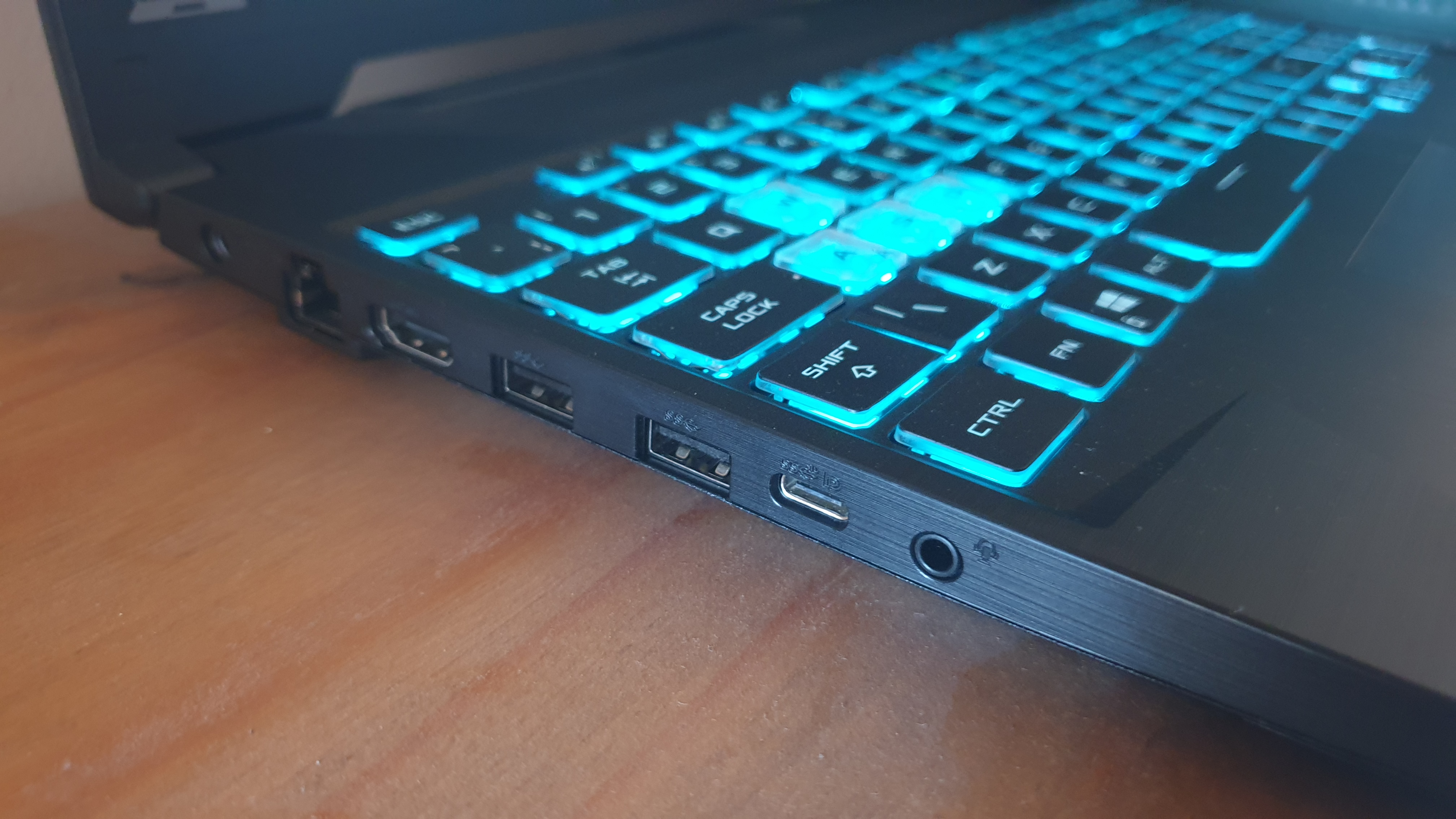
Performance
Here’s how the Asus TUF A15 fared in our suite of benchmark tests:
3DMark: Sky Diver: 33,361; Fire Strike: 14,961; Time Spy: 6,367
Cinebench R20: 4,265 points
GeekBench 5: 1,175 (single-core); 7,708 (multi-core)
PCMark 10 (Home Test): 5,388 points
PCMark 10 Battery Life: 5 hours and 14 minutes
Battery Life (TechRadar movie test): 11 hours and 44 minutes
Total War: Three Kingdoms (1080p, Ultra): 49.9fps; (1080p, Low): 140fps
Metro Exodus (1080p, Ultra): 45.44fps; (1080p, Low): 118fps
As we mentioned at the outset of this review, what made us particularly excited about the Asus TUF A15 is its choice of components, which includes some of the latest hardware from both AMD and Nvidia.
In the CPU department, the Asus TUF A15 features the new AMD Ryzen 7 4800H. It’s not quite the flagship mobile processor from AMD (that’ll be the Ryzen 9 4900HS), but the Asus TUF A15 isn't aiming to be a flagship laptop. What it is aiming to be is a machine that offers a mix of performance and value, and that’s why we like Asus’ choice of the 4800H.
We’ve talked elsewhere about how AMD’s Ryzen 4000 mobile processors could transform gaming laptops, and the Asus TUF A15 is a great example of this, with eight cores and 16 threads bringing a level of power we’d expect to see in much more expensive laptops.
This is paired with an Nvidia RTX 2060 GPU. Again, it's not a flagship GPU, but it's a brilliant 1080p performer, making it a great choice for this kind of gaming laptop. It’s one of Nvidia’s more affordable GPUs, but still offers very good performance, including modern ray tracing support, and with 6GB of GDDR6 memory this is a smart choice for a laptop in which costs need to be kept down.
As you can see from our benchmarks, the graphically-demanding Metro Exodus runs at 45fps (frames per second) at Ultra. With a bit of tweaking, you’ll get it to play over the magic 60fps mark, while still looking great.
With less intensive games, like Fortnite or CS:Go, you’re going to be able to really take advantage of the 144Hz screen for fast and responsive gameplay.
So, this isn’t a gaming laptop that’s stuffed full of the most powerful tech, but it offers excellent performance with modern games at a price point that's a lot more affordable than those of high-end gaming laptops. That’s a win in our book.
One thing that did bug us, however, was how loud the laptop got when playing games. When the fans on this thing kick in, they kick in loud. We’re used to loud gaming laptops – they’ve got to be kept cool somehow – but the fans in the Asus TUF A15 are particularly distracting.
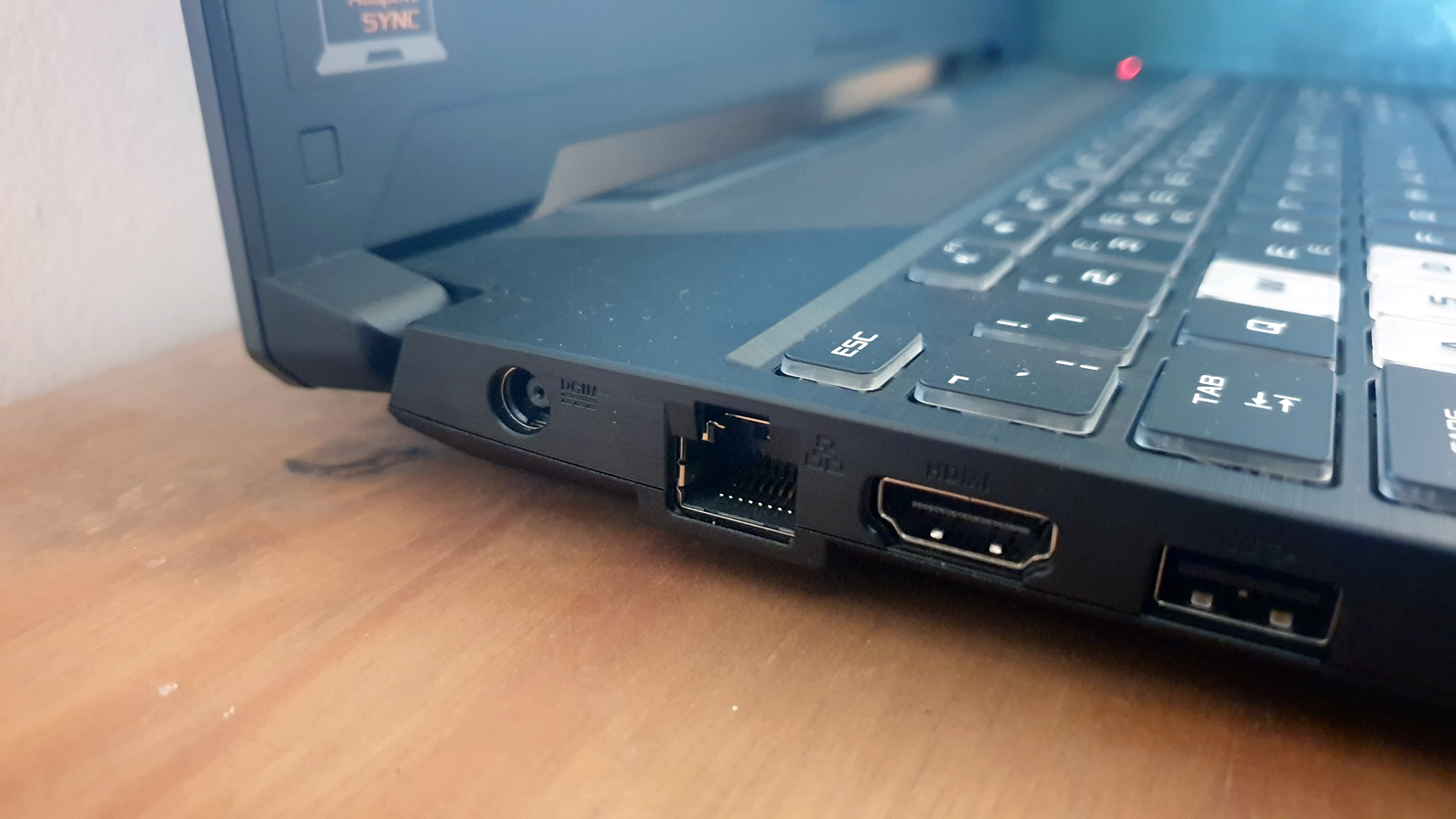
Battery life
We’ve come to never expect too much from a gaming laptop when it comes to battery life, but the Asus TUF A15 doesn’t do too badly here, with the PCMark 10 battery life benchmark, which replicates moderate use, taking five and a quarter hours to drain the battery.
That’s not too bad for a gaming laptop, and it’s in part thanks to the energy efficiency of the AMD Ryzen 7 4800H, which doesn’t deplete the battery as fast as the more power-hungry Intel CPUs we often find in these laptops.
The battery here is a huge 90Wh one, which is a lot larger than you’d usually find in a gaming laptop (and not far off the maximum size you’re legally allowed to bring onto a plane), and that also explains the excellent 11 hours, 44 minutes, uptime we recorded in our looped 1080p video benchmark.
While playing a looped video isn’t the most demanding of tasks, the fact that the TUF A15 lasted so long is very impressive. When it comes to gaming, however, the uptime drops to around two hours, depending on the kind of game you’re playing. That’s still not bad, and could get you through a shortish train journey; but, as with other gaming laptops, you’ll want to plug this in while you play.
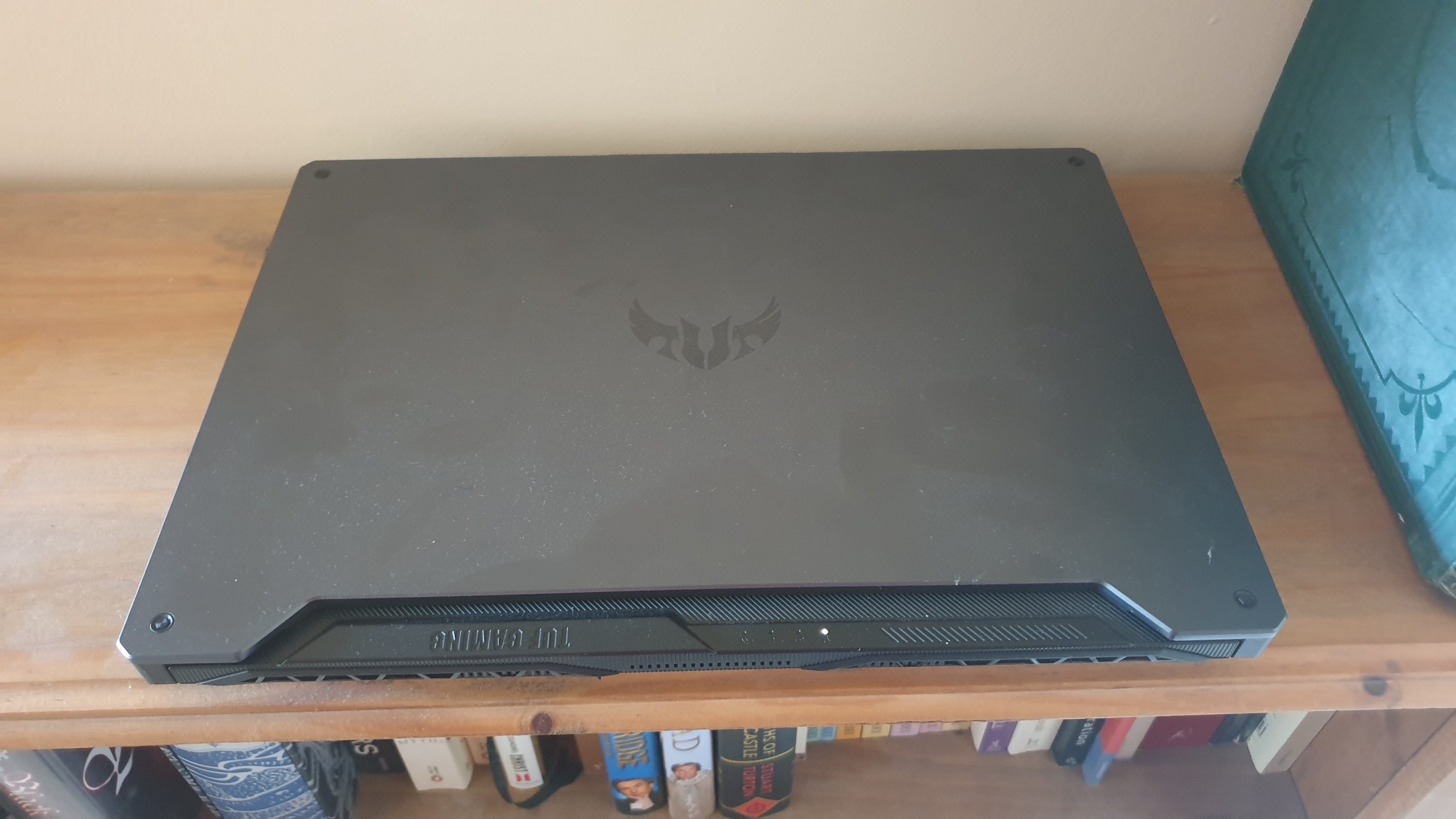
Buy it if...
You want an affordable gaming laptop
The Asus TUF A15 offers excellent value for money. While it’s not the cheapest gaming laptop in the world, it manages to offer build quality and performance that its mid-range and budget rivals lack.
You want a laptop for competitive play
The Asus TUF A15 is great for people who play a lot of competitive esports, thanks to a high-refresh-rate monitor for fast response times, and a built-in LAN port for fast and stable connectivity.
You want robust build quality
Asus’ TUF lineup of gaming laptops make a big deal of their military-grade durability, and for good reason. These laptops feel like they’d last a long time, and it means you can take one out and about with you without worrying about it getting damaged.
Don't buy it if...
You’re all about the 4K
The Asus TUF A15 is a fine performer at 1080p, but don’t expect eye-popping 4K visuals. First of all, the screen is ‘just’ Full HD, but even if you hook the laptop up to a 4K monitor or TV, the RTX 2060 GPU won’t cut it.
You want something thin and light
The extra ports and tough body means this is not a thin and light laptop in any shape or form. If you want something that's ultra-portable, look elsewhere.
You want a silent machine
The Asus TUF A15 is a noisy machine when the fans kick in, and while you can limit how much they're used, you'll also want to keep the laptop cool. It’s a tricky balance, but we found the noise to be quite distracting when gaming.
- Check out our Asus coupon codes for the latest savings and deals.
- These are the best gaming laptops of 2020

Matt is TechRadar's Managing Editor for Core Tech, looking after computing and mobile technology. Having written for a number of publications such as PC Plus, PC Format, T3 and Linux Format, there's no aspect of technology that Matt isn't passionate about, especially computing and PC gaming. He’s personally reviewed and used most of the laptops in our best laptops guide - and since joining TechRadar in 2014, he's reviewed over 250 laptops and computing accessories personally.
